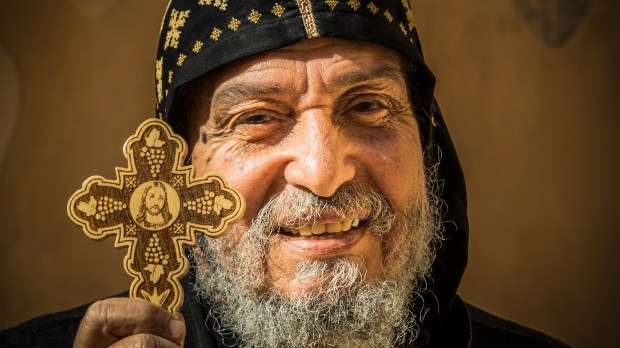From the Aleteia archives:
With the news of the terrible bombing during Divine Liturgy in a Coptic Orthodox church in Cairo, December 11, 2016, attention is being drawn again to the sufferings of Christian brothers and sisters in the Middle East. Who are these Coptic Christians? What do we share with them?
1.The Coptic Church is among the oldest Christian communities in the world.
Coptic Christians trace the founding of their church to a missionary journey by the evangelist St. Mark in the year 42. According to tradition, Mark spent his last days in Alexandria, then the capital of Greek-influenced Egypt and a center of knowledge and culture in the Mediterranean world. The first converts he made were the native Egyptians known as Copts for the language they spoke, which was the last surviving form of ancient Egyptian. (The word Copt is rooted in the ancient Egyptian word that describes a person from Egypt.)
2. Since the 5th century, the Coptic Orthodox Church has been out of communion with Rome and with the Eastern Orthodox churches. The Coptic Catholic Church, a tradition that split off at the same time, is today in full communion with Rome.
The divisions occurred over complex points of theology (particularly the understanding of the nature of Christ) and authority following the Council of Chalcedon in 451. The Coptic Orthodox Church is autocephalic (its own independent church). It has followers among Egyptian immigrants to other countries in Africa and around the world, including the US, and “daughter churches” in Ethiopia and Eritrea, and is in communion with the Oriental Orthodox churches. The Coptic language, which was written using Greek letters, remains the official liturgical language of the church, but over the centuries has been gradually replaced by Arabic, the vernacular of modern Egypt. Coptic Orthodox Christians, like many other Eastern and Oriental Orthodox Christians, follow the Julian calendar, with Christmas celebrated on January 7. Today, the Coptic Orthodox Church is headquartered in Cairo at St. Mark’s Cathedral (next door to the chapel where the bombing occurred), although the symbolic center of Coptic Christian life remains Alexandria.
The Coptic Catholic Church is headed by a Patriarch (bishop) who pledges obedience to Pope Francis. Coptic Catholics celebrate their own liturgical rite, and continue to use the Coptic language for Mass. The Coptic Catholic Church also traces its origins to St. Mark and Alexandria, but is today headquarted in Nasr City, a suburb of Cairo, at the cathedral of Our Lady of Egypt.
3. The Patriarch of the Coptic Orthodox is known as the Pope.
Before the divisions in Christianity between east and west, the patriarch (or head bishop) of the Coptic See of Alexandria was considered, by reason of the church’s age, primer inter pares (“first among equals”). By tradition, the first Patriarch of Alexandria was ordained by St. Mark himself. Like the Bishop of Rome, the Coptic Orthodox patriarch has been called pappas (“Father”) for generations, and today the Orthodox Patriarch carries the title of Pope. Pope Tawadros II succeeded to the office in 2012 after the death of Pope Shenouda III. Bishop Tawadros was selected by having his name chosen by a blind child from among ballots containing the names of three candidates. Pope Francis considers Pope Tawadros II his brother in Christ, and called him directly to offer sympathy and prayers after Sunday’s bombing.
4. Coptic Christians gave us the first school of catechesis and the blessing of the monastic tradition.
Under the Copts, Alexandria gave rise to a catechetical school where Christian doctrine took shape. Many of the early Church fathers lived or studied in Alexandria, joining the Greek philosophers and Jewish scholars who already made the city their home. Besides catechetical studies, the school taught humanities and mathematics. Its library contained carved wood texts with raised letters so the blind could study – long before the invention of Braille. The desert fathers of Egypt began the heremitic and monastic traditions that would later inspire St. Basil of Cappadocia in the East and St. Benedict in the West.
5. Coptic Christians have undergone persecution at various times throughout history.
After the Council of Chalcedon, Coptic Orthodox Christians suffered persecution at the hands of Byzantine Christians who considered them heretics. Many were tortured, imprisoned, and killed, but the Coptic Orthodox remained faithful to their understanding of Christology. With the rise of Islam and the Umayyad conquest of Egypt, most of the population retained their Coptic Christianity at first. Later the taxation and limitation of opportunities that were the price of being Christian under Islamic rule drew many Egyptians to convert to Islam. Gradually, Egypt became a Muslim-majority country, and today Coptic Christians represent only 10%-20% of the population. Since the rise of Islamic militarism, however, Copts (both Orthodox and Catholic), like other Middle Eastern Christians, have come under violent attack from terrorist groups. The December 11 bombing, for which no group has yet taken credit as this is published, appears to be one more in a growing list of attacks.
More to read: Women were the targets: Cairo attack was a strike at the womb of the Church
Blood and water unite Catholics and Copts, Pope Francis tells Egyptian church

